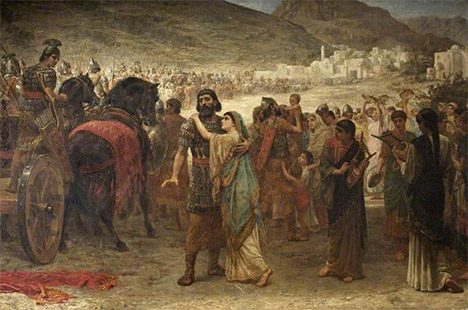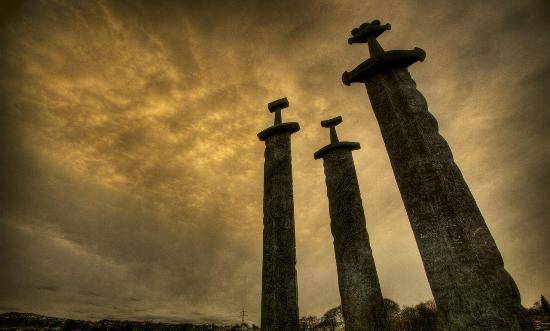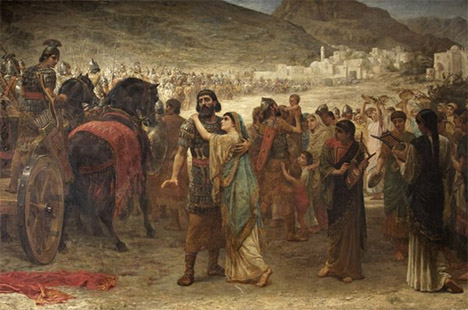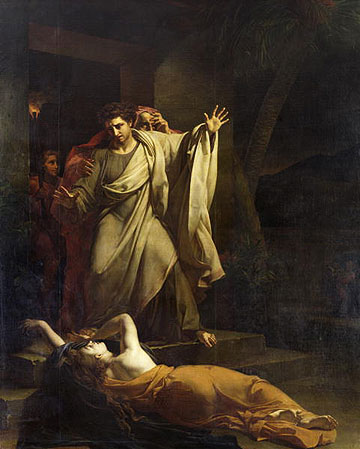Judges is About Needing God as King, not Man



“Although the Bible has no corporeal legendary swords, it does have a kind of legendary swordsman.”

“The guardian’s role is to prevent evil; the judge’s role is to deliver from evil, once it has been allowed in.”
An excerpt from James B. Jordan’s commentary on Judges (47-51) concerning the role of Israel’s Messiahs.
What were the judges? They were civil rulers and deliverers of Israel. God is concerned with all of human life and society. It is false to try to limit His interest only to the institutional Church, though as the sacramental body of Jesus Christ, the Church is the foremost earthly “institution.” The judges show us God delivering His people from His and their enemies, in particular in social and political situations. According to Scripture, the civil magistrate bears the sword of iron (as distinct from the Sword of the Scriptures) as a threat to evildoers. A magistrate is a minister of God, no less than a Church officer is, but the magistrate is a minister of God’s vengeance, while the elder is a minister of redemption. (See Romans 13.)
In the Bible, everything is confirmed by the testimony of two or three witnesses. (James Jordan notes that this is the basis for Hebrew parallelism and also verbal pleonasm. See Symbolism – A Manifesto.) An example of a “dual” witness from God would include the two dreams given to Joseph, and the two dreams given to Pharaoh. We see each Covenant confirmed by two witnesses as well. The Mosaic Covenant was a double witness at three levels: the two tablets of the Law, the second set of tablets, then a second giving of the Law in Deuteronomy.
A sign was given to Gideon to prove that God would save Israel by Gideon’s hand. He requested a second sign, and rather than chiding him, the Lord acquiesced. The Lord Himself asks us to prove all things. That explains the double sign, but not the ingredients of the signs, the fleece and the threshing floor. Fortunately, the consistency of biblical symbolism and structure not only gives us the answer, it reveals the events as a type of the events which followed, and, typologically, also shines light on the process of the first century apostolic witness.
“I will open my mouth in a parable;
I will utter dark sayings from of old… “
Psalm 78:2
The account of Samson’s marriage and the subsequent collateral damage is one of those stories out of which teachers and preachers try in vain to wring a moral. After all, isn’t that what the Old Testament is for? Actually, no. It is a history of God’s Covenants, and every single text, whether historical narrative or prophetic vision, has a Covenant structure. Certainly, there are morals, but some stories resist such an obvious use (unless we are willing to cook the Book). These stories of God’s delegated authorities are intended to illustrate the work of God in the world.

One problem with modern conservative scholarship is its reluctance to deal with types that are not explicitly described in the text. This means that a lot of what is considered interpretation is merely application.
Aside from those types which are explicitly explained, the typological nature of Biblical history is rejected. Thus most of its “bandwidth” remains unheard. The result of this severe “downsampling” is that a lot of that application is off-the-mark because a clumsy search for a moral to the story has taken the place of the typological message. The principles drawn from the histories are not universals but abstracts, because we are looking for morals, not looking at men made in the image of God.
[This post has been refined and included in Sweet Counsel: Essays to Brighten the Eyes.]
Continue reading
“…of the angels He says:
‘Who makes His angels spirits
and His ministers a flame of fire.’”
God is the source of all things, and He identifies Himself as such in His speeches. Every speech is Covenantal, and every preamble within His speeches is a statement of transcendence. “I am the Lord your God.”
After the initial call comes delegation, Covenantal Hierarchy. A man, a Moses, an Abraham, receives the Word with meekness.
We know that angels are God’s messengers, the sent ones. They administered the Old Covenant as our tutors, Satan becoming the first false teacher, the first corrupt ambassador, or, if you will, the first publican.
[This post has been refined and included in Sweet Counsel: Essays to Brighten the Eyes.]
Continue reading
I am Habakkuk the prophet. And this is the message that the LORD gave me. Our LORD, how long must I beg for your help before you listen? How long before you save us from all this violence? Why do you make me watch such terrible injustice? Why do you allow violence, lawlessness, crime, and cruelty to spread everywhere? Laws cannot be enforced; justice is always the loser; criminals crowd out honest people and twist the laws around.
Habakkuk 1:1-4
[Part 1 here.]
Perhaps there is more to this idea of “suing God” than a mere Puritan quote, especially when God Himself fails to keep His own rules, when God Himself appears to break Covenant.
Continue reading
“…that on you may come all the righteous blood shed on the Land, from the blood of righteous Abel to the blood of Zechariah, son of Berechiah, whom you murdered between the temple and the altar.” Matthew 23:35
“from the blood of Abel to the blood of Zechariah who perished between the altar and the temple. Yes, I say to you, it shall be required of this generation.” Luke 11:51
The Hebrew word for “land” is feminine. [1] The fruitful Bride is pictured in the fruitful field. Both are to be cultivated and cared for under God by Covenant.
When the priesthood was faithful, God promised to make the people, animals and Land fruitful: the Covenant “to,” the input of the Spirit as Head, as Covenant Word made flesh. Deuteronomy 28 gives a long list of ways in which God would make her abundant. Continue reading
Does the Bible really contain everything the man of God requires? The curve balls of history call the church to greater and greater wisdom, but the principles remain the same. What if one of the oddest books of the Old Testament contained crucial advice for modern western culture and the Christians attempting to deal with its tragi-comic apostasy? Continue reading